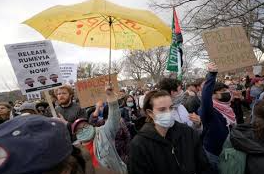
Military Leader Pledges Security and Reforms Amid International Condemnation
Burkina Faso’s new military leader, Lt. Col. Paul Henri Sandaogo Damiba, has pledged to restore security and order to the nation, emphasising unity while cautioning against betrayal under the new regime. Speaking from the presidential palace in his first address since overthrowing President Roch Marc Christian Kabore, Damiba outlined his vision for a safer, more cohesive Burkina Faso.
In his televised speech, Damiba declared, “Our country is facing an unprecedented crisis. The priority is to strengthen security by revitalising our armed forces and listening to the needs of our people.” He stressed that the challenges ahead require collective effort and sacrifice, stating, “This mission is not mine alone; it belongs to all of us.”
The coup, which unfolded earlier this week, was driven by frustrations over the previous government’s inability to combat the jihadist insurgency that has claimed thousands of lives. President Kabore, who was detained and later resigned, has not been seen publicly since. The junta insists he is being kept in a safe location.
In the days following the coup, the junta has sought to gain support from key groups, including religious and community leaders, unions, and security forces. Moussa Diallo, a union representative, reported that the junta has vowed to address governance issues while discouraging dissent. “Damiba assured us of his intentions but issued a warning against opposing the regime,” Diallo said.
The international response to the coup has been overwhelmingly critical. The United Nations Secretary-General, Antonio Guterres, urged the junta to restore constitutional order and pledged support for the people of Burkina Faso. Similarly, the U.S. State Department expressed concerns over the suspension of the constitution and government dissolution.
The West African economic bloc ECOWAS has condemned the coup and plans to hold a summit to address the situation. Damiba, however, appealed for continued international cooperation, stating, “Burkina Faso needs its partners now more than ever. We ask for support in overcoming this crisis and resuming our path toward development.”
As the junta consolidates power, the future of Burkina Faso hangs in the balance, with its citizens and international allies closely watching for the next steps in the nation’s turbulent journey.












